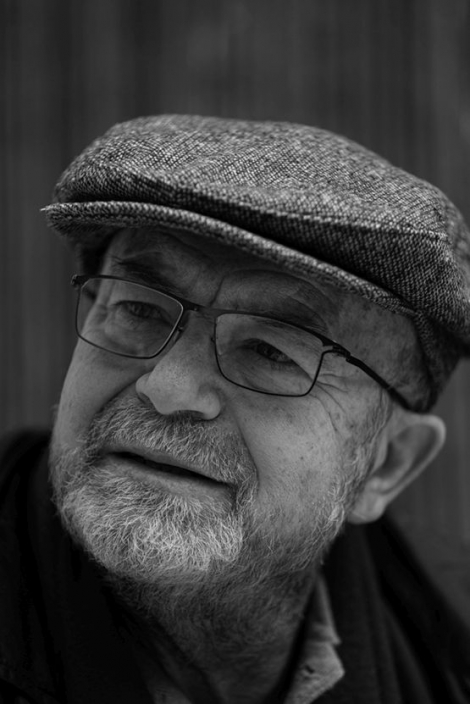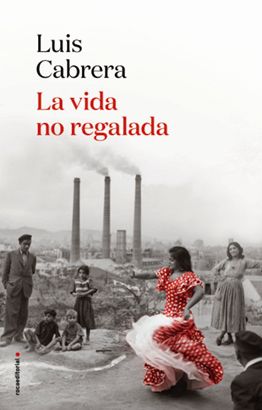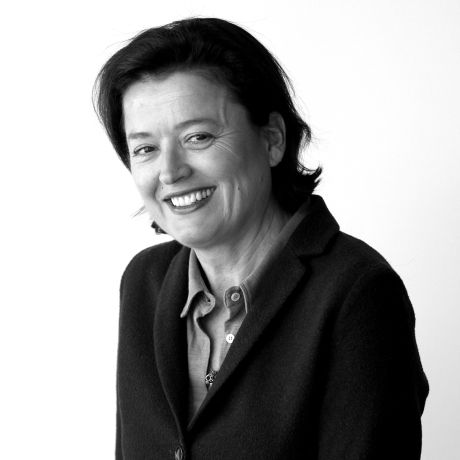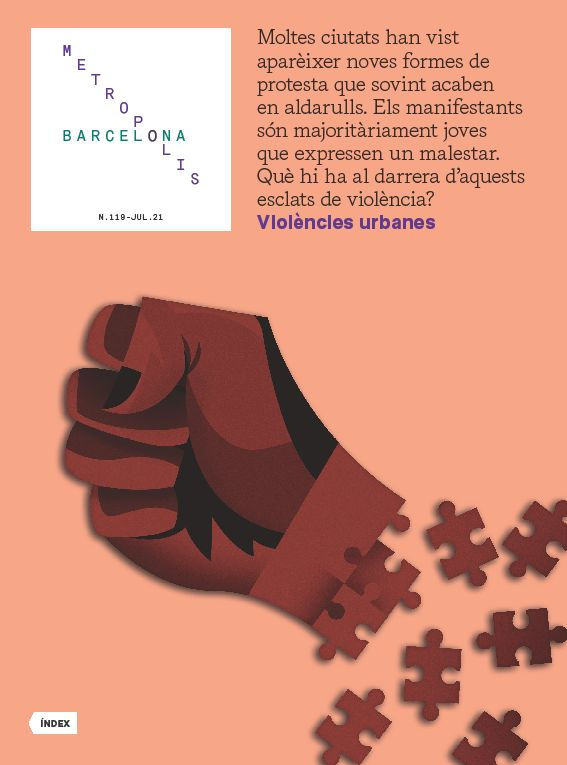“When they hurt me, I didn’t turn the other cheek”
- Culture Folder
- Interview
- Sep 21
- 16 mins
Luis Cabrera

Thanks to his tenacity, his personal rebelliousness and his untameable nature, Luis Cabrera (Arbuniel, Jaén, 1954) has been weaving an abundantly rich life story that he now explains in his memoir La vida no regalada [Not a Given Life] (Roca Editorial). A biographical novel that describes: Lorenzo Almendro, his alter ego, who rescues the humiliated child running around in outlandish outfits in a town in the Jaén mountains, from where, at the age of nine, he and his family will “be uprooted”; the beardless and intrepid adolescent who gets involved in the anti-Franco struggle and residents’ movements in Barcelona’s Verdum neighbourhood; and the hustler who travels Europe as a busker or the visionary who sets up the Taller de Músics [pioneering school in teaching jazz and modern music in Barcelona].
He has never stopped being who he was. He is the author of the essays Els altres andalusos [The Other Andalusians] and Catalunya serà impura o no serà Catalunya [Catalonia Will Be Impure or Will Not Be Catalonia], and throughout the conversation he gives free rein to a marvellous stream of ideas and experiences, juicy stories and insightful reflections.
“I came to this world to make a mark,” he writes at the end of the book. From the get-go were you clear about what you wanted to do and have you done it?
Since I was born, circumstances have been adverse to me. My family was very poor, of very humble means, but my mother could sew. She had taken a pattern-making correspondence course and, using just scraps of material, she made outfits for my sister and I, which were so amazing that not even the well-heeled wore them. And that, in Arbuniel, the small town in Jaén where I lived until I was nine years old, was the source of great surprise and envy. I was also a very slender child, with piercing green eyes. I looked like a girl and I was laughed at and humiliated. But I knew I wasn’t a girl and for a long time I had to contend with that stigma. Boys chased me and yelled “girl” at me. They also gave me the nickname “Torero” [bullfighter].
Because you were very forward?
No, because of a red outfit my mother had made for me, with black leather lapels, a matching waistcoat, and patent leather shoes. I must have been seven years old and, needless to say, going out looking like that...
And how did you take it?
Badly, very badly. The thing is that good and bad are two sides of the same coin. I was sharp as a tack, I was a fast learner, and all those older kids who picked on me would come back later to ask for help with their homework. I would say yes, but I tricked them so that the teacher would give them the rod the following day. It was my revenge; the evil side to me surfaced there. I believe that a dual personality was beginning to take shape in me at that point that I have had to polish, administer and manage over the years. In the end, kindness won out. But when they hurt me, I didn’t turn the other cheek. They beat me in the street and, when I would get home, my mother would give me a good throuncing, even with her high heels, because she was very conceited. She would beat me over everything. For having waded into the river to catch crabs or for ruining my runners playing soccer. Whatever it was, that was how she settled everything.
Have you come to understand her, to forgive her?
No, now she’s 94 years old and we’ll see... But there have been times when it was impossible.
Faced with these acts of hostility, leaving your hometown and coming to Barcelona might seem like a liberation for a nine-year-old boy. However, you describe the family departure in a truck loaded with beds with a harrowing image: “sitting on the mattresses facing the opposite direction of movement”.
I didn’t want to leave the town, for me it was banishment. I think it’s time for us to talk about exile. In the case of parents, of grown-ups, one can talk about immigration, but the children of those people who had to leave for political, social or economic reasons, they literally uprooted us from our lives. And that rips you apart. And that determination to outdo yourself, to leave a mark, springs from there.
What impression did that cement-block Barcelona make on you that you saw from the Verdum neighbourhood?
There were streets full of dirt and stones with uneven ground and fields full of rubble. I didn’t understand a thing. Those five-storey blocks on the street Cuartel Simancas, where we lived, were like terrifying giants. I asked myself: what am I doing here? The kids, many from my town and even some relatives who had brought their anger with them, kept hurrying me along, forgetting about me. I remember that I made two friends, Braulio, a Cuban who had come to live with some Galician relatives, and Joan Sans Villena, a Catalan who lived on a ground floor with a vegetable garden at the back that reminded me of the houses back in my home town. He had caught my attention because his mother would come to the door and say: “Joan, vine a dinar.” [Joan, come in for lunch – in Catalan.] Mine, from the third floor fourth flat, shouted: “Luis, sube a comer”. [Luis, come upstairs for lunch – in Spanish.] And I thought, “that’s mine, the different language”, just like the Cuban, who also could speak Galician. And so my interest in learning Catalan stemmed from there.
At what point did that shy and easily scared child die and was the rebellious and tenacious Luis Cabrera that we know today born?
 © Martí Petit
© Martí PetitI owe that to my father, to whom I dedicate the book. He was such a good man who didn’t speak to avoid hurting or offending anyone, so my mother was in charge of the household. She never stopped bugging him. “You work in metallurgy, but you spend the weekends at home idle, twiddling your thumbs,” she went on at him. And she kept harping on... Until one day he went to the town of Santa Coloma to the house of a man from our hometown who had a bar, El Descosío, to ask him for a job. He didn’t usually drink, but that day he came back drunk. He went upstairs on all fours and once he had sobered up he called me and said: “Luis, sometimes you have to get drunk to do what you are not capable of doing when sober. You have to swear something to me. That you are going to beat the first person in the gang who disrespects you till you draw blood. I’ll be at the window watching.” And that’s what I did, and from that point on, they more or less left me in peace. And it’s at that moment, at the age of 13, being able to face something that until then I hadn’t even been able to contemplate, that Luis Cabrera was born.
And you became an adult overnight.
At the age of 14, I finished primary education and started working in a winery, then as a waiter in a bar in the Horta neighbourhood. From there I moved to the textile industry and later I think I became the first courier there was in Barcelona. With a Moby, I worked delivering photos of weddings, baptisms and communions, I collected invoices in grocery stores in the Eixample neighbourhood and I distributed the sports newspaper 4-2-4, by the Grupo Mundo. I took a liking to the freelance life, the freedom of working hours, and never again did I work for someone else. I have always gotten by on my own and at my own risk.
One day, at the age of 16, you heard Morente on the programme “Romero y su tocadiscos flamenco” [Romero and his flamenco record player] and that turned your life around.
“Sentado sobre los muertos” [Sitting on the dead], by Miguel Hernández, was playing, which ends: “Varios tragos es la vida y un solo trago es la muerte” [Life is several drinks and death is just one drink] (singing). I went into shock. When I heard that voice, those turns and that text, I said to myself: “I have to meet that man.” I had already started to frequent the basements of the San Sebastián parish, which was a haven for all the illegality in the area, and I was also in charge of the Culture Committee of the Verdum Residents’ Association. I suggested setting up the Peña Flamenca Enrique Morente [the Enrique Morente flamenco enthusiasts’ club].
You went to Madrid to meet the master and had an initiation night.
I introduced myself to Radio Juventud and asked Ricardo Romero for his phone number, who warned me: “be careful, because Morente is red”. I called him and we met in a café on the main thoroughfare Gran Vía. He was with Pansequito and Indio Gitano. Imagine he was amused by the idea that I was green as grass. Then we went to dinner and ended up in a kind of nightclub where the gypsies gathered who controlled the prostitution that was the best of a bad bunch. They went to that club in the small hours of the morning, to crunch the numbers. And Camarón was there. I saw how he and Enrique hugged each other, they were like brothers. And I, following Enrique’s advice, who had told me that, if I wanted to be accepted in the flamenco world, I had to do what I saw everyone else was doing, I started drinking whiskeys and smoking pot. You wouldn’t believe it but I was a virgin in those things, but I sign up for everything. Hours later, Morente and Camarón got caught up in a head-to-head row and it was madness. And I heard the word duende [heightened state of emotion, expression and authenticity, associated with flamenco] emerge from the mouth of one of those gypsies for the first time. On leaving, stumbling around in the street, I asked Enrique what it was. “Look, Luis, duende is two drunks on the street looking for a car that they can’t find”. And there I began to understand the sense of humour, the sarcasm, the intelligence and the grace of a person who has been my brother and my mentor.
And there you stopped being “Torero” [Bullfighter] to become “El Drogas” [The Druggy]?
They started calling me that when I joined the Red Flag [Communist Organisation of Spain], a mess that I got into out of kinship with two kids my age, Fernando Pindado, El Tati, and Francisco Martínez, Chapo. At that time, El Pitus, one of the leaders of the Nou Barris neighbourhood, used to come to the club with his people, who made his spliffs… The older people took no notice of the matter, but I did. And hence the nickname “El Drogas”. In the 1970s, being from the PSUC [Unified Socialist Party of Catalonia] in Nou Barris was to be right-wing. But I always had a contradiction between Marxists and libertarians, until one day some old CNT [Spanish confederation of anarcho-syndicalist labour unions] members, cultured people, made me see that they were using me to distribute political pamphlets that other people wrote, when I could surely write them better.
But the police caught you red-handed, and you turned 18 in La Modelo prison, amidst rumbas [a style of flamenco music].
A 17-year-old lad, for what should have been a misdemeanour, was charged with carrying all kinds of devices, spikes, chains, lead pipes, to arm the defence pickets in a demonstration in support of a general strike in Ferrol. That was me. A police car turned up and took me to the Via Laietana police station. Right off the bat they gave me two slaps, because they are more humiliating than punches, and I couldn’t think of anything else other than to ask them whether they were Catalan. The trouble began. They tied me to a chain and started pushing and shoving me, insults and spitting ensued… That went on for three days, and I kept harping on about Catalan. It came out naturally. I wanted to fluster them, provoke them, because I remembered what my father had told me. If I humbled myself, I was a goner, I thought. Then I entered La Modelo prison and there I was saved because, instead of being amongst the political prisoners, I connected with small-time crooks that I knew from the neighbourhood and who protected me from the group of tough guys. We even threw a party to celebrate my birthday, with a cake that my grandmother managed to send me. Guitars and pot appeared, and we sang rumbas to Camarón, Bambino, Los Chichos... I was there for a few days. A year after leaving, I freed myself from the yoke of communism, because it was a stranglehold to me.
Although before going to prison you had already tried a new libertarian style travelling through Europe as a busker.
I wanted to see how people lived in democratic countries. With three fellow club members we toured practically the length and breadth of Europe in six months. Morcillo did the handclapping, Lázaro played the guitar, Conchi danced and I sang. We earned lots of money performing in squares. Outside the Louvre it was incredible, I had never had so many cameras filming us. We had our base in the freetown of Christiania, in Copenhagen, where there were showers and communal dormitories that helped me to learn a great deal about lovemaking techniques... But I was obsessed with finding out who was in charge in that commune, until I stumbled on three university lecturers who were the ones pulling the strings. Then we went to Stockholm and things got complicated. It was cold, people didn’t stop in the street, and we had to get by playing scoundrels, robbing supermarkets and leaving restaurants without paying. And they caught us, needless to say.
From that time in Christiania, you brought back The Little Red Schoolbook, a book that would be decisive in the new turn your life would take years later.
 © Martí Petit
© Martí PetitThe flamenco club, to which people like Pasqual Maragall or Josep Maria Balcells came to give talks, disbanded in 1978. Some guys had turned up there, including Joaquín Gambín, El Grillo [The Cricket], who were actually police snitches and they wanted to recruit young people for the FAI [Iberian Anarchist Federation]. Four kids got involved and were later arrested for their involvement in the Scala case [relating to the trial following the fire in Barcelona’s Scala nightclub]. Many members dropped out en masse and that was the end of the club. I had met Fernando H. Les shortly before, who had a publishing company, Distribuciones Epicuro, which ran the Castellote Editor collection. And we came up with the idea of translating The Little Red Schoolbook from Danish, which the Christiania gurus had given us. We released 200,000 copies and it was sold for 50 pesetas. We took boxes and boxes to the kiosks on La Rambla, which were gone in a matter of days. We starting getting orders from bookstores all over Spain and this time we were also nabbed.
At the premises on the street Requesens, in the Raval neighbourhood, where you had the distributor, soon after you set up the Taller de Músics, a school that connected flamenco with jazz. Mayte Martín, Miguel Poveda, Chicuelo and Rosalía, to name but a few, attended the school… Today it is part of normality, but at that time your aspiration to teach flamenco in a school was little less than an anathema.
I’ve never believed the whole blood thing. If a flamenco performer is born in the jungle surrounded by animals, they do not even learn to speak, no matter how gypsy they are. At most they will imitate the sounds of a tiger, the trees or the rain. If you are born into a family where they sing and dance, you imitate your elders, you sing and dance, but there’s an abyss between there and being a professional. Flamenco has a code as complex as that of classical music, and the funny thing is that, like jazz, it originated in the poor classes, illiterate people who create amazing codes in harmony and rhythm. That has a great deal of value, it is a rich heritage.
In the novel, you explain that you managed to oust the trafficking of heroin from the Raval neighbourhood thanks to Camarón. Is that what really happened?
Completely. There was a serious drug problem in the area, about forty young people had died and the police did nothing. I found out that an old badass, a sinister and dark character, who carried a gun lived above where JazzSí is now. I imagined that he must have known who was in control of the heroin situation and I went to ask him, because it had to end. “Do you know Camarón?”, he asked me. “Yes, I know him.” “Well, if you can get him to meet the kingpin who controls heroin, drugs in this area are over.” Through a nurse from Can Ruti I put them in touch, they met in a bar, photos were taken, and after three days practically all the drug-dealing foot soldiers around the Taller de Músics had disappeared. The boss, a pot-bellied and burly gypsy, was found dead a month and a half later in his house, surrounded by bottles of whiskey, heroin and coke sachets. The party had gotten out of hand.
Are you afraid of anything?
Nothing. Only the ignorant of us aren’t afraid.
Ultimately, you always keep your head above water, but it seems as if you have been swimming against the current your whole life. You asked a gypsy for his daughter’s hand in marriage, and he didn’t make it easy for you.
He had married a paya [term in Spanish for non-gypsy] and he wouldn’t allow me to marry his daughter, so we eloped and didn’t show up until six months later. My wife and I, and my in-laws, took part in the neighbourhood struggles in Roquetes, hijacking buses to lengthen their journey to the end of the steepest streets. Then came the disappointment of the working-class myth. My wife and I shared the housework; I also did the laundry, scrubbed floors or went out to the communal terrace to hang out the clothes. And they started calling me a fag. That wasn’t for me, I realised that I had to get out of the ghetto. It was one thing to fight for the neighbourhood to have decent conditions, and another thing was personal issues, which those workers didn’t get. And we went to live in the Gràcia neighbourhood.
In his last concert at El Molino, a month before he died, in 2010, Enrique Morente dedicated a soleá [flamenco song] to his friend Luis, about whom he said: “I have not met anyone who has been able to make more enemies in such a short time”. Do you have more enemies than friends?
Yes, of course. A friend can be your worst enemy because they know more about you than anyone else.
Llibre
 La vida no regaladaRoca Editorial, 2021
La vida no regaladaRoca Editorial, 2021
The newsletter
Subscribe to our newsletter to keep up to date with Barcelona Metròpolis' new developments




